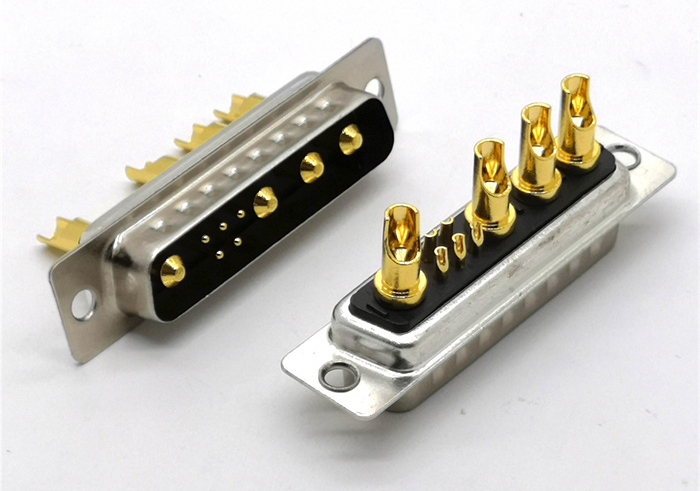High current machined pin contacts use in D-Sub Connectors
In the intricate world of electronics, the reliability of connections within printed circuit boards (PCBs) is paramount.High current machined pin contacts use in D-Sub Connectors is widely, That are crucial components that facilitate these connections. These pins come in various diameters, including the newly introduced .060" (1.52 mm) and .080" (2.03 mm) sizes and more siezs, offering a range of options for different mechanical strength and current requirements.
Types and Applications
Straight Pins
Straight PCB pins are designed for vertical insertion into the PCB. They are simple, robust, and ideal for applications requiring straightforward electrical connections. Their primary application is in through-hole mounting, providing excellent mechanical strength and reliability.
Right-Angle Pins
Right-angle PCB pins offer a 90-degree bend, allowing for horizontal connections while being mounted vertically on the board. These are particularly useful in applications where space is limited, and a compact design is necessary.
Solder Cup Pins
Solder Cup pins offer soldering for wires and cables for different application. The current can be support 10A,20A,30A ,40A high power cable. They are commonly used in industrial control systems and automotive electronics for their compact size and durability.
Manufacturing Process
Machined PCB pins are crafted through precision machining processes that ensure their accuracy and consistency. Mill-Max's pins are made from high-quality brass, providing high mechanical strength and electrical conductivity. The manufacturing process involves cutting, shaping, and polishing the pins to achieve a precise fit and finish .
Plating Options
To enhance their performance, these pins are often plated with gold or nickel. A standard plating option is 10 micro-inches of gold over nickel, which improves conductivity and prevents corrosion, ensuring long-term reliability.
Advantages
The advantages of using machined straight and right angle PCB pins include:
Precision: High-precision machining ensures a perfect fit in PCB assemblies.
Reliability: Gold plating provides anti-corrosion properties, enhancing the longevity of the connection.
Strength: The brass material offers high mechanical strength, suitable for high-current applications.
Versatility: Available in various diameters and lengths to fit different projects designs and requirements.
Selection Criteria
When selecting machined PCB pins, consider the following factors:
Electrical Requirements: Current carrying capacity, voltage rating, and contact resistance.
Mechanical Properties: Pin strength, insertion and withdrawal forces, and resistance to vibration and shock.
Environmental Factors: Operating temperature range, humidity resistance, and corrosion resistance.
Manufacturing Considerations: Assembly method compatibility and ease of rework and repair.
